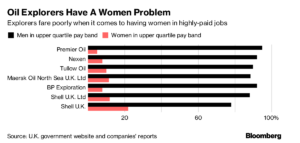
Being a top female earner for a major integrated oil company is a rarity, but among the smaller explorers and producers it’s even more of an anomaly.
Only 5 percent of people in the top pay quartile at the U.K. operations of Premier Oil Plc were women, according to figures the North Sea-focused explorer submitted to the government. That compares with 22 percent at the U.K. operations of Royal Dutch Shell Plc, a much larger company encompassing everything from oil and gas production, to refining, marketing and retail.
There are several reasons for the business of drilling and pumping oil, particularly offshore, to be more male dominated.
Many roles need technical or scientific training, subjects that have historically attracted more men. The job often requires employees to spend weeks offshore on isolated platforms, making it more difficult to offer the flexible working conditions that many companies say improve retention of female employees.
“Our offshore workforce, which represents 7 percent of our employees, is all male,” Premier Oil said in its report. That widens the gap because these roles attract higher pay “due to the working environment.”
The disparity is illustrated by data from Shell. The operations of Shell U.K. — the overall corporate structure in the country — showed a smaller gender pay gap than Shell U.K. Ltd. — its exploration-focused business where women made up only 12 percent of top earners.
Not all explorers have published their findings. Companies including EnQuest Plc and Cairn Energy Plc have until April 4 to submit their figures.

The exploration side of the oil industry shows a similar gender pay gap to commodity trading houses such as Vitol Group and Trafigura Group, where women make up fewer than 5 percent of the top leadership.
They all fared worse than most blue-chip and financial companies in the U.K. For example, 58 percent of Burberry Ltd’s top earners were women and at Goldman Sachs International, 17 percent were female.
Premier Oil said part of the problem lies with training. “The U.K. has the lowest proportion of female engineers in the European Union, less than one in 10 engineering professionals is a woman,” its report said, citing the Perkins Review of Engineering Skills from 2013.
The company said it’s committed to improving the situation, including support for employee ambassadors with a science, technology, engineering and mathematics background in Aberdeen, the major U.K. North Sea oil hub.
Industry and society need to “encourage more girls to take up” these subjects, said Deirdre Michie, chief executive officer at Oil & Gas U.K., the industry lobby. That would create “a pathway for more women to forge careers within the technical sector.”